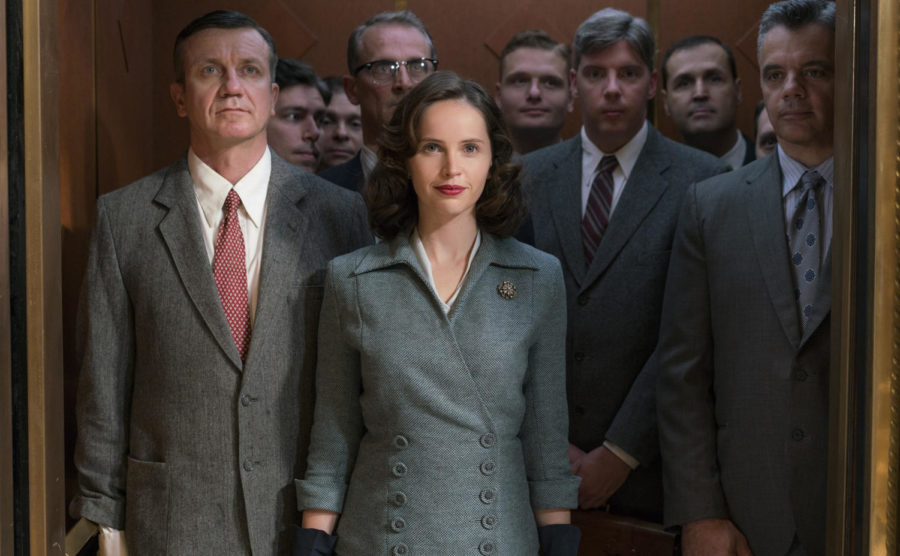On the Basis of Sex: The Incredible Story of One of Our Nation’s Feminist Heroes
.
Jonathan Wenk / Focus Features
Felicity Jones stars as Ruth Bader Ginsburg in Mimi Leder’s ON THE BASIS OF SEX, a Focus Features release.
January 31, 2019
Today, young women often find it difficult to imagine a time in which we did not have access to a proper education and variety of career choices. Nonetheless, we cannot ignore the past, and we must appreciate the steps that have been taken by brave women to make tremendous progress toward equal rights. Mimi Leder’s “On the Basis of Sex,” a biopic that depicts the beginning of Ruth Bader Ginsburg’s fight for equality, is a striking representation of the monumental barriers women have overcome between our past and our current social circumstances.
The movie opens in 1956 with young Ginsburg (Felicity Jones) walking among a sea of men, all anxiously anticipating their first day at Harvard Law School. Out of nearly 500 students in the class, she stands out as one of only nine female class members. From their first orientation, with the school’s president describing the ideal “Harvard Man,” it is clear that the female students are not viewed as legitimate future lawyers. This inferiority is even further enforced at a welcome dinner, during which the female students are put on the spot to prove why they deserved to occupy “a place that could have gone to a man” at the university. The male leadership on campus desperately try to prove that Harvard is no place for a woman, acting as though the young women in the program are an educational burden.
Even after completing her education in law, Ginsburg continues to face sexism as she attempts to find a job, ultimately filling a professor position at Rutgers University after being turned away from law firms for no other reason than her gender. At home, however, she finds relief in a place where gender inequality disappears. Her wonderful husband, Marty Ginsburg (Armie Hammer), is a devoted supporter of her ambitions, refusing to make his own goals the center of attention. In a wonderful reversal of standard gender roles, Marty cooks the family meals and dedicates a great amount of time to caring for their children and household. The relationship is a beautiful one to watch, exemplifying true love, respect, and compassion.
When she takes up her breakthrough case, representing Charles Moritz (Chris Mulkey), the movie shifts to focus primarily on Ginsburg’s arguments about society, gender, and law. The case results from a less common occurrence in which Moritz, a male, was discriminated against because of his gender, denied a tax benefit routinely given to women caring for family members. In preparation for the case, Ginsburg handles intense discussions and conflicts with her proud feminist daughter, Jane (Cailee Spaeny), Mel Wulf of the A.C.L.U. (Justin Theroux), along with a plethora of conservative white men who don’t believe in gender equality. Ultimately, it is her daughter who makes her realize that times have changed with movements and protests; the social and cultural circumstances were not the same as when Ginsburg had faced sex discrimination in her earlier years. Suddenly, she was more motivated than ever to develop a constitutional theory to persuade three male judges. The case keeps the audience sitting on the edge of their seats, cringing through stumbles and cheering as Ginsburg succeeds in presenting a powerful argument. When she approaches the court, Ginsburg states, “We’re not asking you to change the country, that’s already happened without any court’s permission.”
Ginsburg is now one of the three women on the Supreme Court, and very few would argue that she doesn’t deserve her place on the bench. Though the movie ends just after her first breakthrough case, the years portrayed are enough to reveal the enormous obstacles that Ginsburg overcame to achieve her current position. With impeccable performances from every cast member, especially Hammer and Jones, audience members (myself included) left the theater with eyes full of tears. Viewers would scoff in unison at the ridiculous sexist comments, astonished by the atrocious stereotypes and limitations placed on women at the time. There is still so much work left to be done until our society can come close to achieving equality, and women like Ruth Bader Ginsburg exemplify the incredible determination and strength necessary to make progress. She undoubtedly deserves her title: “The Notorious R.B.G.”













